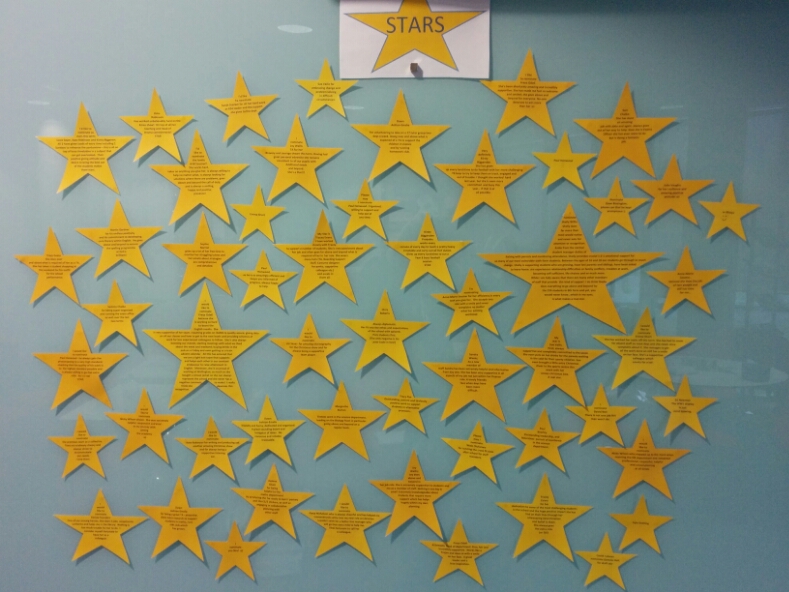Recognising and acknowledging the discretionary effort staff put into an organisation should be far simpler than it is. It is, in truth, a psychological minefield, a potential pot-hole, if not thoroughly thought through and by that I mean at least seven things. I know it seems a lot.
- The action – how1 and who2 and when3 you choose to recognise.
- How the recipient may4 or may not5 receive the gesture.
- How those not recognised, may6 or may not7 respond.
It is not as simple or as clear cut as the intentions that drive it.
Be warned – danger ahead.
Experience is what you get when you don’t get want you want.
I am one of those that have fallen right in. The fall guy to good intention. I have witnessed colleagues, at all levels of leadership, stumble over their well-intended recognitions and shout out. In one-to-one conversations, department meetings and at staff briefings – with the grandest of all calamities reserved for the end of term events – with often the largest convene and live audience. Here are a few of the more common pitfalls and subsequent fails.
#Fails
Staff 100% attendance awards.
Fraught with danger. The pot-holes are often the result of unsophisticated policy and poorly defined criteria or poorly defined definitions of authorised or unauthorised absences that lead to questionable records. That is before you add the line manager interpretation and responsibility for actually recording the absence. The end result is that some staff may work as harder (in some cases harder) than their colleagues, then miss one day for a very genuine reason not recognised or accounted for by the policy and that colleague fall foul of the line.
Thanking leaving staff by name seems simple. It should be. But miss out a colleague, at any level of the organisation, expect to backdraft of disapproval. You can’t even afford to over-look staff that left a day, a week earlier for whatever reason, from your list – without expecting a few “humphs” and disparaging “snorts.” Should you fall foul, all I can say is be humble, but the truth is, it really is too late.
Comedy thank you’s.
So often, these lack sincerity. The other simple fact, not all staff appreciate public recognition. I doubt he will read this post, but I have the sincerest respect for a colleague that left us at Christmas. The greatest courtesy I could pay him was to ensure his leaving was ever so quietly acknowledged. A true gentlemen.
“Staff Member of the Term” Award. I vote very strongly against such practice recently. Even with a good size, credible, nomination pool this award is one large pot-hole. The issue is often witnessed on the fringe of the nominations pool. Why were they nominated. Why was I not nominated? Or in the body language of those that thought they should have won but didn’t. One happy winner, some potential happy nominees, and at least a handful left disgruntled?
Even the humble recognition gift has it’s problems. Very small gifts are often better than small gifts, that rarely meet the expectations of being medium gifts. Very small gifts seem to get away with being, small enough. A token. On a positive, more gifts can be shared. The humble box of celebrations in the staff room. It is the acknowledgement not the weight of the gift.
On recognising staff, you often suffer more if you get it wrong, than you gain, by getting it right. Frustratingly, for the well meaning, industrious recognition team, even getting it ‘right’ rarely makes the extensive efforts seem worthwhile. Hitting it out of the ball park is your only real option.
I believe one of my colleagues recently hit out of the ball park, if not out of the ball park, he hit a home run. He simply asked staff to anonymously recognised their fellow colleagues as ‘Stars’ of the term. A decorated, empty shoe box, left in the staffroom for their nominations, emails were fine too (though clearly not anonymous). All nominations were then typed up on stars and added to the staffroom noticeboard, anonymously. Repeat nominations were included. Simple.
Next term we might go again with stars, but I might suggest a fresh slant and suggest an ABCD board – Above and Beyond the Call of Duty. We have a military connection here at The Wellington Academy you see.
Other ways I found to “thank you” staff – with minimal danger of getting wrong
- At each SLT meeting, we write two “Thank you for going the extra mile” post cards and we all sign it. Delivered to the colleagues pigeon hole. Private and personal.
- Recognise a staff members efforts in front of their line manager / email recognition and cc the line manager. Personal and an very small but important audience.
- Acknowledge a staff member efforts / achievements when preparing a status / update report. Again, consider the audience of the report. Ensure all contributors are noted. Acknowledging groups of staff disperses the risk of individual identification.
- Offer to swap or step into a class with a staff member. Similar, take a colleagues duty or cover lesson for them. As a leader you get to see the absence procedure in action and assess the quality of cover work.
- Nominate the staff member for an external award. More often than note, the external award provider will notify them.
- Drop into the first meeting of a project / support programme – do not over stay your welcome.
- When you hear a positive remark about teacher, a lesson, repeat it to that teacher, the sooner the better. Much the same as forwarding positive voice mail or email messages.
- Ask to see a teacher, thank them and do not discuss any other work issues, none, nada, zilch. It is personal and therefore important.
- Recognise a department in the school Newsletter. (Again groups not individuals).
- Recognise professional qualifications achieved outside of school – (borrowed from Paul Blake).
- Publicly recognise the positive impact on operations of the solutions staff members devise for problems.
- Hold sincere and focused performance review meetings – turn the screen off, the phone off, put a sign on the door and accept no interruptions. See Frances Frei.
- Greet staff members by name.
- Use 3×3 cards to write “You’re special because…” statements. A new take on the Star comments.
- Have spare neutral cards at your disposal so that you can leave a personal message – when you are caught off guard (Tamra Bradbury).
- For you social moguls – share a #ffed. Each Friday, Twitter users utilise the hashtag #ff to recognize other Twitter users, that they follow in an online event known as Follow Friday. Educators have extended that #ffed. It is a great way to get to know who to follow because at least one person has committed to recognising their influence.
- “Mug” someone. We know how protective teachers are of their favourite mug – fill their mug with treats!
- Start a meeting encouraging colleagues to that writing down three things they are grateful for. Research has shown that writing down three things you are grateful for every night can increase overall happiness by 25 per cent. This maybe left field, but it is a micro effort.
Other ways to say thank you with a little more planning
- Inscribe a favourite book as a gift. Any hand written message is more powerful than an email.
- Give the staff member a membership or subscription to a journal that relates to their work.
- Set up a PD opportunity that will help them address a professional focus. Use your PLN connections.
- Design a “____________ Support Kit” – to support that staff member past an obstacle. A marking support kit, stress support kit, “a coping Mr Still with support kit.”
- Serve your staff – lunch? Afternoon tea?
- Give a personalised coffee cup. Combine with point 6 and why not serve them coffee?
- Send / leave a note reading, “Thank you. You are a Lifesaver______!” attaching a pack of Polo’s (Polo’s are in the shape of a rescue buoyancy aid).
- Give a puzzle as an award to a problem solver. Or themed award for any professional talent.
Perhaps one the most powerful ways to say thank you, is to commit a random act of kindness and never admit to it.
- Leave a tray of hot chocolate’s on a wet cold winter day for PE staff.
- Mark a set of books.
- Add a session of cover without them asking because you know they are busy.
- Tidy someone’s room.
- Organise coffee break refreshments – hot choc for PE in winter.
- Provide a data summary.
- Set up guardian angels or academic angels or smile protectors – much like Secret Santa, each staff member is privately assigned a colleague. It is their responsibility to quietly “keep an eye out” for a that colleagues well-being. If that colleague falters, to secretly, protect that colleagues smile – typically by offering a random act of kindness to help “turn that frown-upside-down” again.
All tried and tested.
Don’t forget to be kind to yourself
Research has shown that writing down three things you are grateful for every night can increase overall happiness by 25 per cent.
Reflections
Re-reading this post, some six years after it was originally written, recognising others is not a skill that gets any easier for leaders. In fact, a further six years experience has brought me to the conclusion that I had under played the dangers involved and so added the red warning.
Dedicated to @AndySammons who encourage me to reflect and reconsider the important of compassion and gratitude.
There is a follow up post to this also.
[qr_code_display]


